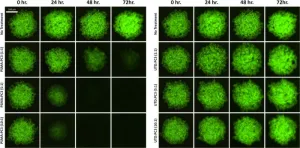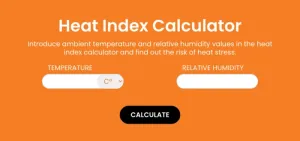(Press-News.org) Clinicians in an intensive care unit need to make complex decisions quickly and precisely, monitoring critically ill or unstable patients around the clock.
Researchers from Carnegie Mellon University's Human-Computer Interaction Institute (HCII) collaborated with physicians and researchers from the University of Pittsburgh and UPMC to determine if artificial intelligence could help in this decision-making process and if clinicians would even trust such assistance.
The team gave 24 ICU physicians access to an AI-based tool designed to help make decisions and found that most incorporated the assistance into some of their decisions.
"It feels like clinicians are excited about the potential for AI to help them, but they might not be familiar with how these AI tools would work. So it's really interesting to bring these systems to them," said Venkatesh Sivaraman, a Ph.D. student in the HCII and member of the research team.
Using the AI Clinician model introduced in Nature by a group of researchers in 2018, the team designed an interactive clinical decision support (CDS) interface — called the AI Clinician Explorer — that provides recommendations for treating sepsis. The model was trained on a data set of more than 18,000 patients who met standard diagnostic criteria for sepsis at some point during their ICU stays. The system enables clinical experts to filter and search for patients in the data set, visualize their disease trajectories, and compare the model predictions to actual treatment decisions delivered at the bedside.
"Clinicians are always entering a lot of data about the patients they see into these computer systems and electronic health records," Sivaraman said. "The idea is that maybe we can learn from some of that data so we can try to speed up some of their processes, make their lives a little bit easier and also maybe improve the consistency of care."
The team put their system to the test via a think-aloud study with 24 clinicians who practice in the ICU and have experience treating sepsis. During the study, participants used a simplified AI Clinician Explorer interface to assess and make treatment decisions for four simulated patient cases.
"We thought the clinicians would either let the AI make the decision entirely or ignore it completely and make their own decision," Sivaraman said.
But the results were not so binary. The team identified four common behaviors among the clinicians: ignore, rely, consider and negotiate. The "ignore" group did not let the AI influence their decision and mostly made their decisions before even looking at the recommendation. By contrast, the "rely" group consistently accepted at least part of the AI's input in every decision. In the "consider" group, physicians thought about the AI recommendation in every case and then either accepted or rejected it. Most participants, however, fell into the "negotiate" group, which includes practitioners who accepted individual aspects of the recommendations in at least one of their decisions, but not all.
The team was surprised by these results, which also provided insight on ways to improve the AI Clinician Explorer. Clinicians expressed concerns that the AI did not have access to more holistic data, such as the patient's general appearance, and were skeptical when the AI made recommendations contrary to what they were taught.
"When the CDS deviates from what clinicians would normally do or consider to be best practice, there was not a good sense of why," Sivaraman said. "So right now, we're focusing on determining how to provide that data and validate these recommendations, which is a challenging problem that will require machine learning and AI."
The team's research doesn't attempt to replace or replicate clinician decision-making, but instead hopes to use AI to reveal patterns that may have gone unnoticed in past patient outcomes.
"There are a lot of diseases, like sepsis, that might present very differently for each patient, and the best course of action might be different depending on that," Sivaraman said. "It's impossible for any one human to amass all that knowledge to know how to do things best in every situation. So maybe AI can nudge them in a direction they hadn't considered or help validate what they consider the best course of action."
Sivaraman's collaborators include Adam Perer, an assistant research professor in the HCII; Leigh Bukowski, a senior research manager at the University of Pittsburgh's School of Public Health; Joel Levin, a doctoral candidate in Pitt's Katz Graduate School of Business; and Jeremy Kahn, a physician in UPMC's Department of Critical Care Medicine and associate professor of critical care medicine and health policy in Pitt's School of Medicine and School of Public Health.
Sivaraman presented the team's paper "Ignore, Trust or Negotiate: Understanding Clinician Acceptance of AI-Based Treatment Recommendations in Health Care" this month at the Association for Computing Machinery's Conference on Human Factors in Computing Systems (CHI 2023) in Hamburg, Germany.
END
AI in the ICU
Carnegie Mellon University Assist in Developing AI-Based System To Recommend Clinical Treatments
2023-04-27
ELSE PRESS RELEASES FROM THIS DATE:
Record ammonia production achieved with inexpensive cobalt catalyst at low temperatures
2023-04-27
Ammonia (NH3) is one of the most widely produced chemicals in the world, with a production of over 187 million tons in 2020. About 85% of it is used to produce nitrogenous fertilizers, while the rest is used for refining petroleum, manufacturing a wide range of other chemicals, and creating synthetic fibers such as nylon. However, all this comes at a high energy cost. Currently, most of the ammonia is produced using the conventional Haber-Bosch process, which requires combining nitrogen and hydrogen at high temperatures (400-450°C) and pressures (200 atmospheres). As a result, scientists ...
Analyzing CAR-T cells with image cytometry for potential solid tumor treatments
2023-04-27
Oak Brook, IL – The April 2023 issue of SLAS Discovery contains six full-length articles and one mini-review covering high-throughput screening (HTS) for protease-inhibiting drugs, high-content phenotypic screening and other life sciences research.
Featured in this month’s issue is the article “High-Throughput Method to Analyze the Cytotoxicity of CAR-T Cells in a 3D Tumor Spheroid Model Using Image Cytometry,” by Zurowski, et al, where the authors focus on the use of chimeric ...
10 popular diets scored for heart-healthy elements; some need improvement
2023-04-27
Statement Highlights:
A new American Heart Association scientific statement assesses and scores the heart healthiness of popular dietary patterns.
Several dietary patterns, including the DASH-style eating plan, Mediterranean, pescatarian and vegetarian eating patterns, received top ratings for aligning with the Association’s dietary guidance.
A few eating patterns, including Paleo and ketogenic diets, contradict the Association’s guidance and did not rank as heart-healthy eating patterns.
The statement suggests opportunities for dietary research and interventions to promote health equity, recognizing the importance of social determinants of health in shaping dietary ...
Twilight zone at risk from climate change
2023-04-27
Life in the ocean’s “twilight zone” could decline dramatically due to climate change, new research suggests.
The twilight zone (200m to 1,000m deep) gets very little light but is home to a wide variety of organisms and billions of tonnes of organic matter.
The new study warns that climate change could cause a 20-40% reduction in twilight zone life by the end of the century.
And in a high-emissions future, life in the twilight zone could be severely depleted within 150 years, with no recovery for ...
Researchers from ISGlobal and LSHTM call for incorporating heat stress indices into communication of dangerous heat waves
2023-04-27
In the summer of 2022, over 20,000 excess deaths across Spain, France, Germany and Great Britain were suggested to have been linked to extremely hot weather. In the context of global warming where climate models point to the fact that extreme heat waves are likely to increase both in frequency and magnitude, preventive measures and adequate communication of dangerous conditions take on special relevance. In a Brief Communication published in npj Climate and Atmospheric Science, researchers from the Barcelona Institute for Global Health (ISGlobal), a centre supported ...
Discovery could improve survival of bladder cancer patients
2023-04-27
· Bladder cancer is the fourth-most diagnosed cancer in men, and survival for patients with advanced bladder is less than a year
· Doctors don’t know which bladder cancer patients will benefit from immunotherapy
·Treatment of patients with ineffective therapy causes unneeded harm and delays treatment with optimal therapies
Chicago --- In a discovery that could improve the survival of bladder cancer patients, Northwestern Medicine scientists have developed a biomarker signature test to predict which ...
Odyssey of a 90-Year-Old from Israel, the United Kingdom, Australia and Singapore
2023-04-27
Down Memory Lane: Peter Ellinger’s Memoirs details the life of Law Professor Peter Ellinger, which has taken him around the world from Israel, to the United Kingdom, Australasia and finally Singapore, where he has chosen to retire. From his escape from Austria during Hitler’s reign, to his growing-up years in Israel, academia and legal practice, and his eventual retirement, this book takes you on a journey in time alongside Professor Ellinger.
Professor Ellinger is a Professor Emeritus of the National University of Singapore ...
German researchers figure out how lager first developed in Bavaria
2023-04-27
A new paper in FEMS Yeast Research, published by Oxford University Press, reveals the possible origin story of lager beers. Using historical records and contemporary phylogenomics research, investigators here show where lagers likely first originated: at the court brewery (Hofbräuhaus) of Maximilian the Great, elector of Bavaria, in Munich in 1602.
Beer has been made since ancient times. Recent archaeology shows evidence of brewing in the eastern Mediterranean some 13,000 years ago. Although from the origins of brewing until the early 20th century, ale was ...
Discovering hidden order in disordered crystals
2023-04-27
Researchers at Tokyo Tech have discovered hidden chemical order of the Mo and Nb atoms in disordered Ba7Nb4MoO20, by combining state-of-the-art techniques, including resonant X-ray diffraction and solid-state nuclear magnetic resonance. This study provides valuable insights into how a material’s properties, such as ionic conduction, can be heavily influenced by its hidden chemical order. These results would stimulate significant advances in materials science and engineering.
Determining the precise structure of a crystalline solid is a challenging endeavor. Materials properties ...
Claus Daniel to lead Argonne’s Advanced Energy Technologies organization
2023-04-27
The U.S. Department of Energy’s (DOE) Argonne National Laboratory has named Claus Daniel as Associate Laboratory Director for Advanced Energy Technologies (AET). He will begin his new role on Monday, May 1.
Daniel will join Argonne from Carrier Corporation, where he leads engineering partnerships and sustainability as part of Carrier’s strategy and innovation team. He manages the effort to decarbonize the product portfolio, with activities spanning 16 time zones in the U.S., Europe and Asia. Prior to joining Carrier, Daniel spent 16 years with DOE’s Oak Ridge National Laboratory (ORNL) in a number of roles.
“It is an exciting ...
LAST 30 PRESS RELEASES:
New method could reveal hidden supermassive black hole binaries
Novel AI model accurately detects placenta accreta in pregnancy before delivery, new research shows
Global Physics Photowalk winners announced
Exercise trains a mouse's brain to build endurance
New-onset nonarteritic anterior ischemic optic neuropathy and initiators of semaglutide in US veterans with type 2 diabetes
Availability of higher-level neonatal care in rural and urban US hospitals
Researchers identify brain circuit and cells that link prior experiences to appetite
Frog love songs and the sounds of climate change
Hunter-gatherers northwestern Europe adopted farming from migrant women, study reveals
Light-based sensor detects early molecular signs of cancer in the blood
3D MIR technique guides precision treatment of kids’ heart conditions
Which childhood abuse survivors are at elevated risk of depression? New study provides important clues
Plants retain a ‘genetic memory’ of past population crashes, study shows
CPR skills prepare communities to save lives when seconds matter
FAU study finds teen ‘sexting’ surge, warns of sextortion and privacy risks
Chinese Guidelines for Clinical Diagnosis, Treatment, and Management of Cirrhosis (2025)
Insilico Medicine featured in Harvard Business School case on Rentosertib
Towards unlocking the full potential of sodium- and potassium-ion batteries
UC Irvine-led team creates first cell type-specific gene regulatory maps for Alzheimer’s disease
Unraveling the mystery of why some cancer treatments stop working
From polls to public policy: how artificial intelligence is distorting online research
Climate policy must consider cross-border pollution “exchanges” to address inequality and achieve health benefits, research finds
What drives a mysterious sodium pump?
Study reveals new cellular mechanisms that allow the most common chronic cardiac arrhythmia to persist in the heart
Scientists discover new gatekeeper cell in the brain
High blood pressure: trained laypeople improve healthcare in rural Africa
Pitt research reveals protective key that may curb insulin-resistance and prevent diabetes
Queen Mary research results in changes to NHS guidelines
Sleep‑aligned fasting improves key heart and blood‑sugar markers
Releasing pollack at depth could benefit their long-term survival, study suggests
[Press-News.org] AI in the ICUCarnegie Mellon University Assist in Developing AI-Based System To Recommend Clinical Treatments





